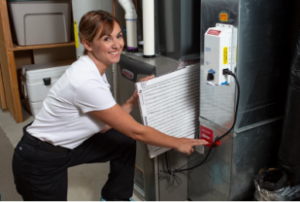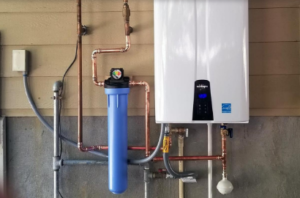Winter is synonymous with cozy evenings by the fire, warm blankets, and steaming cups of cocoa. But it’s also the season when utility bills tend to skyrocket. As temperatures drop, heating systems work overtime, lights stay on longer, and energy consumption increases. This can take a toll on your budget, leaving many homeowners searching for effective ways to cut costs.
In this article, we’ll explore four actionable tips for saving money on utility bills in winter. These strategies are designed to help you maintain comfort in your home while keeping your energy costs in check. Whether you’re looking to reduce heating expenses or make your home more energy-efficient, this guide has got you covered.
Here are 4 Tips for Saving Money on Utility Bills in Winter
1. Optimize Your Heating System

Heating accounts for a significant portion of winter utility bills, often making up nearly 50% of the average household’s energy use. By optimizing your heating system, you can reduce unnecessary energy consumption without sacrificing comfort.
Schedule Regular Maintenance
- Why it matters: A well-maintained heating system runs more efficiently, reducing energy waste and extending the lifespan of your equipment.
- Actionable Tip: Schedule an annual inspection with a licensed HVAC technician. They will check for issues such as dirty filters, leaks, and worn-out components that can compromise performance.
Upgrade to a Smart Thermostat
- Why it matters: Smart thermostats allow you to control your home’s temperature remotely and set schedules that align with your daily routine.
- Actionable Tip: Invest in a thermostat like Nest or Ecobee. These devices learn your habits and adjust temperatures automatically, ensuring you don’t heat your home unnecessarily when no one is there.
Seal Leaks and Insulate
- Why it matters: Air leaks and poor insulation force your heating system to work harder, driving up costs.
- Actionable Tip: Inspect windows, doors, and ducts for leaks. Use weather stripping, caulk, or foam sealant to close gaps. Add insulation to your attic and walls to retain heat more effectively.
2. Make Energy-Efficient Lighting Choices

Shorter winter days mean longer periods of indoor lighting, which can contribute to higher electricity bills. Switching to energy-efficient lighting options can significantly reduce your costs.
Switch to LED Bulbs
- Why it matters: LED bulbs use up to 75% less energy than incandescent bulbs and last up to 25 times longer.
- Actionable Tip: Replace all frequently used bulbs with ENERGY STAR-certified LEDs. These bulbs not only save energy but also emit less heat, reducing the strain on your heating system.
Use Motion Sensors and Timers
- Why it matters: Lights left on unnecessarily waste electricity.
- Actionable Tip: Install motion sensors in commonly used areas like hallways and timers on outdoor lights to ensure they only operate when needed.
Maximize Natural Light
- Why it matters: Natural sunlight can reduce your reliance on artificial lighting and provide passive heating during the day.
- Actionable Tip: Open curtains and blinds during daylight hours to let in sunlight, and close them at night to retain heat.
3. Reduce Water Heating Costs

Water heating is the second-largest energy expense in most households. Small adjustments can lead to significant savings.
Lower the Water Heater Temperature
- Why it matters: Setting your water heater to a lower temperature reduces energy usage without compromising comfort.
- Actionable Tip: Adjust the thermostat to 120°F. This temperature is hot enough for most household needs while minimizing energy waste.
Install Low-Flow Fixtures
- Why it matters: Low-flow showerheads and faucets reduce water usage without affecting pressure.
- Actionable Tip: Look for fixtures labeled as Water Sense certified. These can save thousands of gallons of water annually, reducing both water and heating costs.
Use Cold Water for Laundry
- Why it matters: Heating water for laundry can account for up to 90% of the energy used in washing clothes.
- Actionable Tip: Wash clothes in cold water whenever possible and only run full loads to maximize efficiency.
4. Adopt Energy-Saving Habits

Your daily habits play a crucial role in determining your energy consumption. Small changes can add up to significant savings over time.
Unplug Unused Electronics
- Why it matters: Electronics and appliances consume power even when turned off, a phenomenon known as “phantom load.”
- Actionable Tip: Use power strips to turn off multiple devices at once or unplug items like chargers, TVs, and kitchen appliances when not in use.
Bundle Up Indoors
- Why it matters: Relying less on your heating system by dressing warmly can lower your energy costs.
- Actionable Tip: Wear layers, use blankets, and consider adding area rugs to keep floors warm.
Run Appliances Efficiently
- Why it matters: Appliances like dishwashers and dryers consume significant energy, especially during peak hours.
- Actionable Tip: Run these appliances during off-peak hours and ensure they’re full before use. Clean filters and vents regularly to improve efficiency.
Conclusion
Saving money on utility bills in winter doesn’t have to mean sacrificing comfort. By optimizing your heating system, making energy-efficient lighting choices, reducing water heating costs, and adopting simple energy saving habits, you can enjoy a warm and cozy home without breaking the bank. Start implementing these tips today to see a noticeable difference in your energy bills.
Remember, small changes can lead to big savings over time. If you’re ready to take the next step, consider consulting with an energy expert to identify additional opportunities for efficiency in your home.

